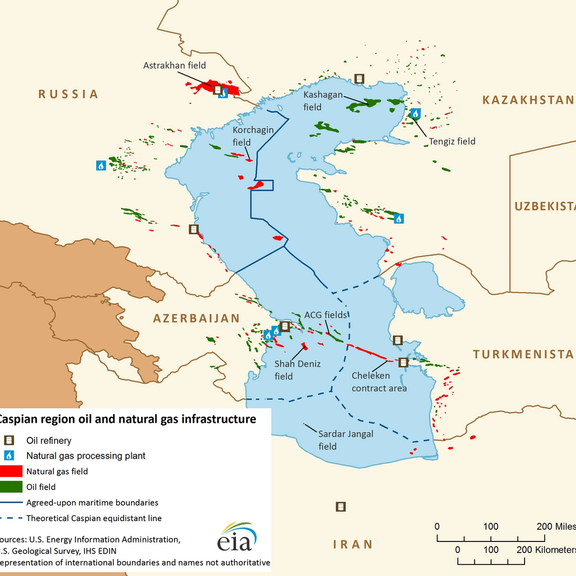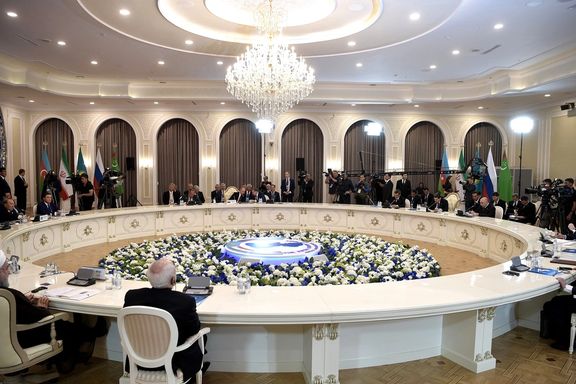UAE’s National Oil Firm Buys Share In Caspian Sea Field

Abu Dhabi National Oil Company (ADNOC) is set to acquire a 30-percent equity stake in the Absheron gas and condensate field in the Caspian Sea.

Abu Dhabi National Oil Company (ADNOC) is set to acquire a 30-percent equity stake in the Absheron gas and condensate field in the Caspian Sea.
According to the ADNOC on Friday, the agreement would see Azerbaijan's state oil company SOCAR and TotalEnergies, which had each previously held a 50-percent stake, both retaining a 35-percent share in the maritime field off the coast of Baku, Azerbaijan.
TotalEnergies announced the first gas delivery from Absheron in July. The French energy group confirmed on Friday it and SOCAR had each sold a 15-percent interest in the field to ADNOC, without specifying the price.
The venture opens up opportunities for ADNOC to expand significantly in the Caspian region with rich energy resources and substantial growth potential, providing access to promising international gas markets in Europe and Central Asia.
Following Russia's invasion of Ukraine in February 2022, the ADNOC has sharpened its focus on the gas market as competition for LNG has ramped up with Europe needing large amounts to help replace Russian gas. ADNOC listed its gas business in March after raising $2.5 billion from an initial public offering (IPO), which was the world's biggest in the first quarter of 2023.

While the Islamic Republic is using the Caspian Sea as a route to move drones, ammunition, and mortar shells to Russia for use in Ukraine, other countries are vying for the huge European energy market.
Iran is also cooperating with Russia in the Chalous gas field in the Caspian Sea, with the potentially lucrative field being at the center of discussions over an Iran-Russia 20-year strategic deal. In June 2021, Iran’s Khazar Exploration and Production Company (Kepco), then touted as the field’s main developer, suggested the field held 30 percent of the developable natural gas reserves of all Caspian Sea littoral counties and could potentially meet 20 percent of all European demand for gas. According to Simon Watkins of Oilprice.com in November 2021, further studies have revealed that the field has far more reserves than previously thought, with a total 7.1 trillion cubic meters, about half the reserves of South Pars, Iran’s huge field in the Persian Gulf.
The Caspian Sea was a Russo-Iranian shared water until 1991. Following the collapse of the Soviet Union, Kazakhstan, Azerbaijan, and Turkmenistan claimed a minimum 20-percent share of the sea. Tehran – along with Moscow – were the main losers of territory in the new demarcation of boundaries and prefer he Soviet-Iranian settlement to be valid in the post-Soviet era.
For almost three decades, the five littoral countries have argued over how to divide the world’s biggest enclosed body of water. The Convention on the legal status of the Caspian Sea -- a treaty signed in Aktau, Kazakhstan, in 2018 by the Islamic Republic of Iran, Russia, Kazakhstan, Azerbaijan, and Turkmenistan – significantly reduced Iran’s rights. Iran only controls 680 kilometers or, in other words, 10 percent of the 7,000-kilometer coastline of the Caspian Sea. Due to the presence of numerous oil fields on the seabed of the Caspian Sea the question of legal status is also very important, so the delimitation of the seabed is yet to be agreed on between littoral nations, Iranian President Hassan Rouhani said after signing the agreement.

Nicolas Terraz, the president of exploration and production at TotalEnergies, welcomed ADNOC as one of the strategic partners to the project, saying the Absheron gas field “offers a significant further development potential to meet the growing gas demand.”
ADNOC's investment in Azerbaijan is in line with the UAE’s aspirations to grow its international gas business portfolio, a strategic plan that saw the oil giant offering with BP to jointly acquire 50% of Israeli offshore natural gas producer NewMed Energy. The $2-billion offer marked Abu Dhabi’s state oil company entering Israel's growing energy sector.